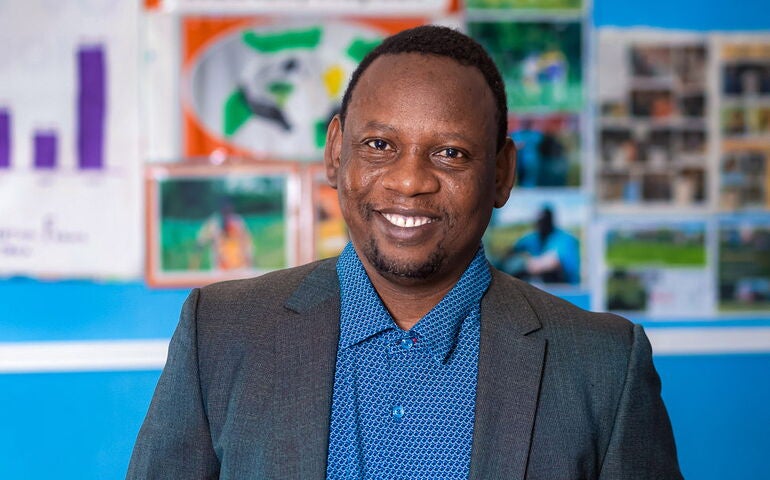Processing Your Payment
Please do not leave this page until complete. This can take a few moments.
- News
-
Editions
View Digital Editions
Biweekly Issues
- December 15, 2025
- December 1, 2025
- Nov. 17, 2025
- November 03, 2025
- October 20, 2025
- October 6, 2025
- + More
Special Editions
- Lists
- Viewpoints
-
Our Events
Event Info
Award Honorees
- Calendar
- Biz Marketplace
Business Leaders: Muhidin Libah is cultivating farms, a nonprofit and Maine's Somali Bantu community
 Photo / Tim Greenway
Muhidin Libah is co-founder and executive director of the Somali Bantu Community Association of Maine.
Photo / Tim Greenway
Muhidin Libah is co-founder and executive director of the Somali Bantu Community Association of Maine.
Muhidin Libah has pushed through and beyond some daunting barriers in his life. He now helps others break down obstacles of their own in his role of executive director at the Somali Bantu Community Association.
Libah was born in southern Somalia, grew up in a Kenyan refugee camp and came to the U.S. in 2004. He settled first in Syracuse, N.Y, and moved to Lewiston the next year — bringing with him rich experience in farming and a passion for helping his community. He helped launch the Somali Bantu Community Association of Maine in 2005.
He has also helped launch several other nonprofits, including the Middle Jubba Relief and Sustainability Organization. In addition, Libah is a CNA certified to do medical translation. He graduated from the University of Southern Maine with a bachelor’s degree in natural applied science, concentrating in biology with a minor in holistic health.
Mainebiz: What was the biggest hurdle you faced in the early days of your organization?
Muhidin Libah: When I helped start the Somali Bantu Community Association, I did not know how to run an organization. But I was one of the few people in the community who could speak English upon arrival. And we became — by necessity — a self-help organization, providing transitional services that were needed by the community.
One of the challenges we faced was that we did not know anyone to ask for help, and we were not experienced in running a nonprofit. It took me 10 steps to do something that only took one for others. And nobody seemed to trust us at first. Our ability to operate always seemed to get undermined.
MB: As Liberation Farms grew, what kind of challenges have you faced along the way?
ML: Access to a piece of land was the greatest challenge for our farmers. There were times when we were renting four different properties, across multiple counties. And securing long-term leases was also challenging because we were dealing sometimes with over 100 farmers.
Now that we have our own piece of land to farm, the challenge is that we need infrastructure like roads and buildings for processing vegetables.
MB: Do you feel Maine is a welcoming place for people who have immigrated here?
ML: Maine is an easy-going and accessible state.
When I was living in New York, I was in a larger city, and it was hard to adapt to the pace. It was also hard to figure out where you could go to get help. Here in Maine, people are understanding, and will take the time to listen. The colleges and universities here are also willing to help out grassroots organizations.
MB: What kind of ‘barriers’ do you feel you and your organization have helped break?
ML: We’ve helped our community start a farming business when it would have been very, very difficult to access land or get other resources that are necessary.
MB: Are you worried about the political divisiveness in the U.S. and the negative feelings sometimes expressed toward immigrant groups?
ML: Since 2015, we have been seeing people who openly express hatred toward African immigrants, and this has affected us all. So much to the point that we have to make sure the places we go are safe.
For some of our community members, the radius of their movements has been dramatically reduced, because we see people who are ready to attack us and cause harm.
MB: Over the next five years, what are your plans for the association, for Liberation Farms, and yourself?
ML: Our plan is to become self-sufficient. We are planning to continue farming produce and meat, to have food that people can access and know where it’s from, to create jobs for our community, and to earn livelihoods for our families.
MB: What words of advice would you give to a businessperson from another country coming to Maine?
ML: It is not easy to start a new business in Maine, but it is doable. Patience is the key. And be friendly — even when dealing with people who are not your friends.
Somali Bantu Community Association of Maine
somalibantumaine.org / 222 Pine St., Lewiston
What it does: Runs a community agriculture program in Wales, Liberation Farms, that provides New American farmers land and other help so they can produce sustainable food for themselves, their families and their communities.
Also provides community advocacy, such as conflict resolution, translation and interpretation; immigration services, such as preparing for citizenship interviews; medical coordination, such as helping navigate insurance coverage; and cultural programs for youth.
Employees: 10 staff, dozens of farmers
Mainebiz web partners

The Giving Guide
The Giving Guide helps nonprofits have the opportunity to showcase and differentiate their organizations so that businesses better understand how they can contribute to a nonprofit’s mission and work.
Learn More
Work for ME
Work for ME is a workforce development tool to help Maine’s employers target Maine’s emerging workforce. Work for ME highlights each industry, its impact on Maine’s economy, the jobs available to entry-level workers, the training and education needed to get a career started.
Learn More
Groundbreaking Maine
Whether you’re a developer, financer, architect, or industry enthusiast, Groundbreaking Maine is crafted to be your go-to source for valuable insights in Maine’s real estate and construction community.
Learn more-
The Giving Guide
The Giving Guide helps nonprofits have the opportunity to showcase and differentiate their organizations so that businesses better understand how they can contribute to a nonprofit’s mission and work.
-
Work for ME
Work for ME is a workforce development tool to help Maine’s employers target Maine’s emerging workforce. Work for ME highlights each industry, its impact on Maine’s economy, the jobs available to entry-level workers, the training and education needed to get a career started.
-
Groundbreaking Maine
Whether you’re a developer, financer, architect, or industry enthusiast, Groundbreaking Maine is crafted to be your go-to source for valuable insights in Maine’s real estate and construction community.
ABOUT
NEW ENGLAND BUSINESS MEDIA SITES
No articles left
Get access now
In order to use this feature, we need some information from you. You can also login or register for a free account.
By clicking submit you are agreeing to our cookie usage and Privacy Policy
Already have an account? Login
Already have an account? Login
Want to create an account? Register
Get access now
In order to use this feature, we need some information from you. You can also login or register for a free account.
By clicking submit you are agreeing to our cookie usage and Privacy Policy
Already have an account? Login
Already have an account? Login
Want to create an account? Register







0 Comments